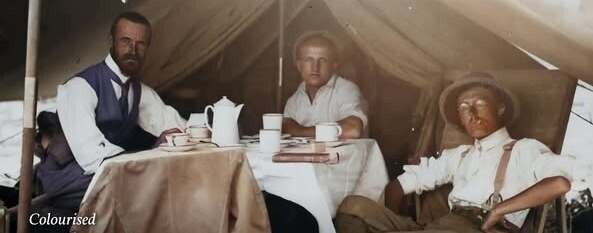Set in southern Namibia, Great Namaqualand, ‘Bittersweet Karas Home’ is the story of three families, the Hills, Walsers & Hartungs, whose lives merge and intertwine in a semi-arid land that presents both hardship and blessings. Over the next few months, we would like to share this bittersweet saga with you from the (as yet) unpublished book.
𝐂𝐇𝐀𝐏𝐓𝐄𝐑 𝐓𝐇𝐑𝐄𝐄
Running away from Home
Emil Friedrich Hartung’s journey to Enos
Emil Friedrich Hartung was born in Kassel (Hesse, Germany) on 3 September 1848. This was the year referred to as ‘Springtime of the Peoples’, a year of political upheaval throughout Europe. Uprisings commenced in Italy, climaxed in France and then spread to various German states, Poland, Hungary and even Brazil. It was Germany’s first attempt to establish a democratic and, at the same time, unified German state. In the same year, however, the old powers crushed the movement and aborted the Paul’s Church Parliament in nearby Frankfurt, contributing to widespread despair and an upsurge in emigration, mainly to the USA.
Emil Friedrich’s parents, Johann Georg Hartung and Anna Maria Hartung, had a flat in Kassel’s prestigious Königstrasse in the 1860s. Their street and the Königsplatz, which divided the street into an upper and lower section, were masterpieces of the renowned architect and town planner, Simon Louis du Ry. The king honoured in the street’s name was the Swedish King Friedrich, who was the Landgrave of Hesse and whose name, as an expression of Hessian patriotism, was also given to Emil as his middle name.
His parents were proud of the apartment, the location and the education they could offer Emil Friedrich. So was he, and would remain so until the end of his days. Emil, however, dreamed of America and its freedoms. One day, he turned off Königstrasse into Kölnische and then Kurfürsten Strasse. He entered the central railway station with bated breath and a beating heart. He had enough money for a ticket to Hamburg and a few weeks food. It troubled him that he had left without a goodbye to his parents and beloved sister, Anna, and he wondered if he would ever see them again.
For any emigration to be legal, a certificate proving that the male emigrant was no longer wanted as a conscript was required. This regulation ceased to apply once you had reached neighbouring harbour towns like Hamburg, Bremerhaven or Cuxhaven. An estimated 50 percent of emigrating young men of military age were draft dodgers, one of them being Emil Friedrich. Conscription was something to be avoided; it meant being subjected to harsh military discipline and to the possibility of a real war. The aristocrats no longer sold their subjects as mercenaries and the Napoleonic Wars were over, but wars like the Franco-Prussian War (1870-1871) were on the horizon in a time of rising national ambitions. The missionary Tobias Fenchel, who was a year younger than Emil Friedrich, would have to participate in this war as a paramedic before he was able to travel to Keetmanshoop in 1876.
It is estimated that about 20 000 Hessians emigrated to America in the late 1800s. Of this number, over 9 000 were from Hesse-Kassel. Emil Friedrich was part of this mass movement, even though his decision was an individual one. His money would not buy him a trans-Atlantic voyage, not even on a lower deck but he had sufficient money for the train ticket, which would get him started, and this he happily presented to the conductor. As soon as he was in the compartment, he made himself comfortable on his bench and watched the landscape fly past, becoming flatter with every mile. When the train rattled onto the bridge crossing the Elbe River, granting him his first vista of the huge Hamburg harbour, he was elated. Once off the train in Hamburg’s central station, he asked for directions to the port. He passed the grandiose town hall and soon smelled the salt of the sea, even though the North Sea was another hundred kilometres down the Elbe. Closer to the warehouses, coffee, curry, cinnamon and clove scents filled the air. The harbour was gigantic and processed enormous amounts of cargo. As a deck hand, stevedore or longshoreman he could replenish his purse and gain essential knowledge about trans-Atlantic ships. He approached a few burly men and asked them where stevedores were hired. They told him that the day’s vacancies had already been filled but that he could return at sunrise.
Within a few weeks Emil had found a trans-Atlantic vessel that was bound for New York and had persuaded the captain to hire him as a ship boy. The ship was still in the Elbe when his chores started. He mended ropes, washed dishes, scrubbed floors and served the captain. The North Sea was stormy enough to make him seasick and although the Channel and the Atlantic were far from calm, he rapidly overcame his seasickness, finding his sea legs. When they steamed into New York harbour under an overcast sky, he saw seagulls circling the Statue of Liberty and imagined he could almost see the light dancing on her raised arm bearing the torch. He was not allowed to disembark the ship when it had moored and the unloading began. He also could not leave with a suitcase because that would inform the crew that he was about to jump ship. He would have to hide the most valuable objects and his remaining money on his body and sneak out later as inconspicuously as possible.
When he eventually reached the streets of New York, they were teeming with people from almost everywhere in the world. There were Irish, Germans, Hungarians, Italians, Lithuanian Jews and Danes in the crowd, milling on the pavements, hastily crossing the streets, hurrying home or to work and jostling, barely missing fellow walkers. Hardly any of them were second-generation Americans. He had been warned against compatriots who would welcome him exuberantly and then fleece him of his few possessions under the pretext of homeboy solidarity, but he did not have any luggage to give away his status. He had heard about cheap tenement and lodging houses in Manhattan’s Lower East Side. After a long walk through brick canyons, he reached a house that flaunted a sign ‘Lodging house: a night’s rent from 7 to 25 cents’. He gingerly stepped into a dark hall and felt his way upwards on stairs that led into darkness and in air that was stagnant and stale, past sinks where women filled pails, and children pitching marbles. He heard a squeaking pump, a tiny wail, chairs shuffled behind closed doors. Somebody led him to the 25-cent lodging that was called a bedroom. A head-high partition enclosed a space that contained a bed covered with a thin blanket and a well-worn pillow, high enough to allow a person to undress in some privacy. He fell asleep quickly but was woken up by coughing and creaking beds in adjacent cubicles and dormitories. His bed was as uncomfortable as a sailor’s bunk but, being used to that, he fell into a dreamless sleep.
When he woke up to the grey morning light he was depressed. This was not his American dream. He explored the Lower East Side. There were sweatshops where families from toddlers to grandpas rolled cigars. There were flophouses to satisfy lonely men’s desires. There were street urchins playing in dirty alleyways and begging. If you stayed there you were sure to slide into deeper and deeper poverty. Shadows descended on his young ambitions.
He remembered the camaraderie of the stevedores, returned to the harbour and was hired immediately. He found accommodation with a fellow longshoreman and was soon able to rent a decent room. He kept his distance from fellow Germans, preferring to learn the English language.
In the late 1860s, the United States was recovering from the wounds of the Civil War. The gold rush was a thing of the past and the westward expansion had reached the Pacific. ‘Go west, young man, and grow up with the country’ was the slogan coined by Horace Greely in the New York Tribune of 13 July 1865, but Emil Friedrich Hartung did not have sufficient funds. As an illegal alien, the only jobs open to him were unskilled and temporary. He was also not eligible for a loan in accordance with Abraham Lincoln’s Homestead Act of 1862 that encouraged settlement in the west. In the four years he spent in the United States, he learned English and learned about life in the school of hard knocks.
(Join us every Sunday to take a step back in time and follow the interesting, sometimes sweet, sometimes heart-wrenching tale.)








.png)

SUBMIT YOUR COMMENT